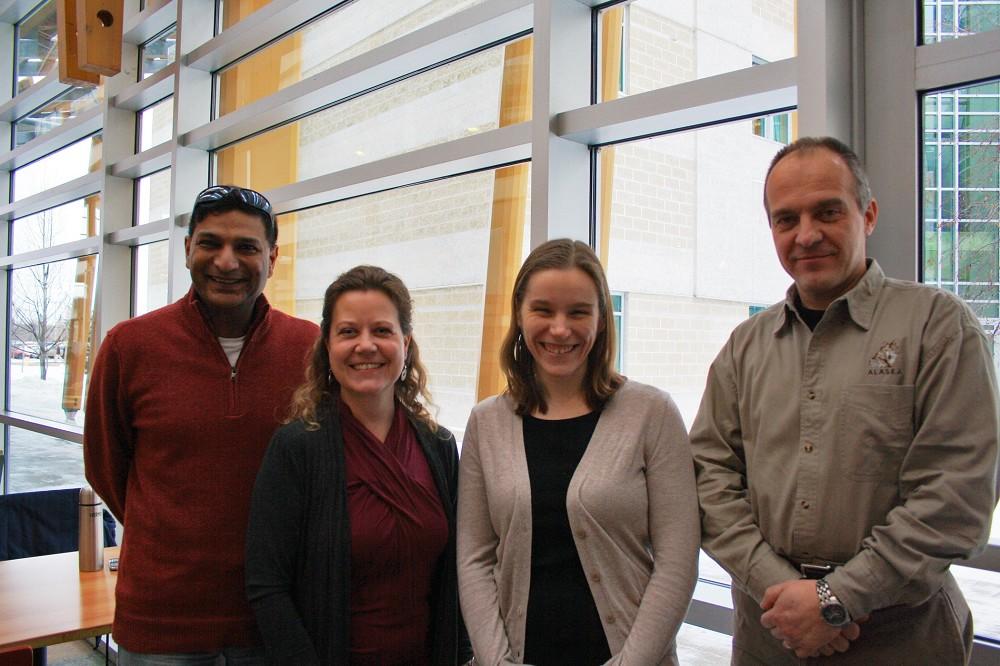New Stroke Research Project Example of Patient-Focused Research
by Graham Strong
 New stroke research going on in Thunder Bay right now focuses on the patient’s objectives, not just statistical ones. From left, Vineet Johnson, Kirsti Reinikka, Dr. Jane Lawrence Dewar, and Dan Vasiliu.
New stroke research going on in Thunder Bay right now focuses on the patient’s objectives, not just statistical ones. From left, Vineet Johnson, Kirsti Reinikka, Dr. Jane Lawrence Dewar, and Dan Vasiliu.Is patient-focused research the future?
It’s already happening at Lakehead University, the St. Joseph’s Care Group, and the Thunder Bay Regional Research Institute (TBRRI). An excellent example of this is a ground-breaking research project launched this spring at the Canada Games Complex that will help stroke survivors regain hand function beyond what they’ve been able to achieve during hospital-based rehabilitation.
“One of the most important aspects of this research is identifying the patient’s objectives,” said Vineet Johnson, a physiotherapist and neuroscientist at Lakehead University, and one of the researchers on the project. “We want our patients – not just our results – to drive our future projects.”
This is important, Johnson said, because it focuses on the patient’s desired outcomes, not the researcher’s. Ultimately, that’s the measurement that counts most.
“If their hand can move one centimetre, that’s huge for (researchers). But participants might not be able to do anything useful like hold a brush or pen. That’s why this type of collaboration is so beneficial, to ensure we’re reaching objectives that meet participants’ needs.”
The research team invented and will be testing a portable rehab device that will help improve hand function beyond what is normally expected. Using a series of testing systems including fMRI, EMG (which measures electrical impulses in muscles), and physical assessments, the researchers will be able to better understand how the rehab process is helping recover hand function and in turn fine-tune rehab methods to make them even more effective.
“Jane (Dr. Jane Lawrence Dewar) looks at what happens in the brain after a stroke, my work looks at how those brain changes affect muscle function, Kirsti (Reinikka) is looking at how the muscle function changes affect hand function and quality of life, Dan (Vasiliu) and I are creating a device to improve function,” Vineet Johnson said. “Last but not least is the patient telling us what is working and what is not.”
Part of the research involves asking stroke survivors what specific tasks are important to them – brushing their teeth, holding a pen, using a TV remote, etc. – and then designing hand function exercises with the device to better accomplish those tasks. The team will receive feedback from the stroke survivors at three separate points during the research. Participants can even agree to take part in some aspects of the project rather than the whole project – something that doesn’t happen often in research.
It’s an approach that takes the person from research participant to a research collaborator, providing a fuller understanding of what’s important to the stroke survivor.
“Their feedback will show whether or not the device and system work from a practical standpoint, not just a statistical one,” Johnson said.
Thank you to all who have supported the TBRRI in the past through the Thunder Bay Regional Health Sciences Foundation’s Health Sciences Discovery Fund, which funded part of the research leading up to this project. Support local research by donating to the Health Sciences Discovery Fund online (healthsciencesfoundation.ca) or by calling the Thunder Bay Regional Health Sciences Foundation at (807) 345-4673. Together, we’re building a healthier, wealthier, and smarter Northwestern Ontario.